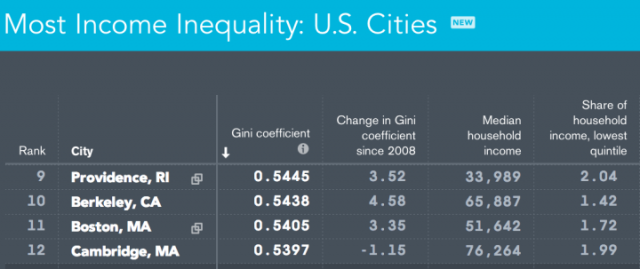By Lance Knobel
Berkeleyside

News and financial information giant Bloomberg ranks Berkeley the city with the 10th-highest income inequality in the country.
Berkeley’s rank is based on Bloomberg’s computation of the Gini coefficients for 300 cities with more than 100,000 people in the United States. A Gini coefficient of 0 would represent perfect equality (everyone with the same income), while a coefficient of 1 would show perfect inequality (one person with all the income). Bloomberg calculates an average Gini score in U.S. cities of 0.4757. Berkeley’s score is 0.5438. Atlanta has the nation's highest level of income inequality, according to Bloomberg, with a score of 0.5882.
But as data journalism website FiveThirtyEight points out, Berkeley’s high ranking for inequality — together with other college towns like Cambridge, Mass. (12th), Eugene, Ore. (22nd), and Boulder, Colo. (24th) — “is because, according to the government’s definitions, most students have very little income, even if they come from rich families. Take out all those 'low-income' students and college towns are actually slightly more equal than average.”
Both Berkeley and Cambridge, however, are affected less by the student distortion than many other college towns, according to FiveThirtyEight′s analysis. Both cities have significant socioeconomic diversity as well as student populations with little income.